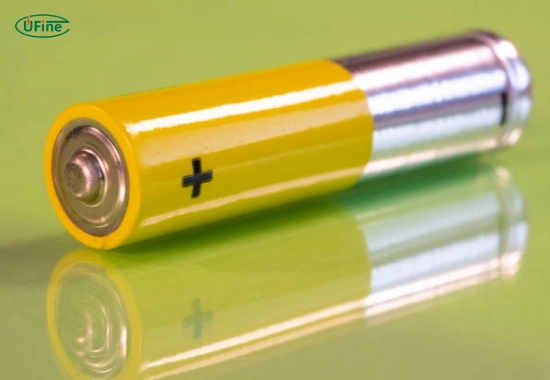What is the weight of an AA battery? This question is essential for many people who use batteries daily. AA batteries are standard in many devices, such as remote controls, toys, flashlights, etc. Knowing the weight of these batteries can help you understand their performance and suitability for different devices. In this article, we will explore the weight of AA batteries, their types, and other related topics.
Part 1. What is an AA battery?
An AA battery is a standard-size cylindrical battery commonly used in portable electronic devices. The dimensions of a typical AA battery are approximately 14.5 mm in diameter and 50.5 mm in height.
Types of AA Batteries
There are several types of AA batteries available on the market:
- Alkaline Batteries: These are the most common type. They offer a good balance between cost and performance, making them popular for everyday use.
- NiMH (Nickel Metal Hydride) Batteries: These rechargeable batteries have a higher capacity than alkaline batteries. Users can reuse them many times, making them more environmentally friendly.
- Lithium Batteries: Lithium batteries are known for being lightweight and having a high energy density. They are often used in high-drain devices like digital cameras.
- Zinc-Carbon Batteries: These are less expensive but have a shorter lifespan than alkaline batteries. They are suitable for low-drain devices.
Understanding the different types of AA batteries helps you choose the right one for your needs.
Part 2. How much does an AA battery weigh?
The weight of an AA battery can vary depending on its type and manufacturer. On average:
- Alkaline AA Battery: Approximately 24 grams (0.85 ounces)
- NiMH AA Battery: Around 30 grams (1.06 ounces)
- Lithium AA Battery: About 15 grams (0.53 ounces)
- Zinc-Carbon AA Battery: Roughly 22 grams (0.78 ounces)
These weights may differ slightly based on brand and design features, but these averages provide a good benchmark for understanding the weight of different types of AA batteries.
Part 3. Why is the weight of an AA battery important?
The weight of an AA battery is significant for several reasons:
- Device Compatibility: Manufacturers design some devices to work best with specific battery weights. Using the wrong type can affect performance and efficiency.
- Shipping Costs: Understanding weight can help manage shipping costs effectively for businesses that ship products containing batteries.
- User Experience: Heavier batteries indicate longer-lasting power, while portable devices prefer lighter ones for ease of use.
Knowing why battery weight matters can help consumers make better choices when selecting batteries for their devices.
Part 4. How does battery weight affect performance?
The weight of a battery can influence its performance in various ways:
- Energy Density: Heavier batteries often have higher energy densities, meaning they can store more energy relative to their size.
- Discharge Rates: Different materials used in battery construction affect how quickly they discharge energy; heavier batteries may offer more stable discharge rates.
- Temperature Sensitivity: Heavier batteries may have better thermal management properties, impacting their performance in extreme temperatures.
Understanding these factors helps consumers make informed choices when selecting device batteries.
Part 5. How has the weight of AA batteries changed over the years?
Over the years, the weight of AA batteries has changed due to advancements in technology and materials used in their construction.
- Early Batteries: Older versions of AA batteries were often heavier because they used materials that needed to be more efficient in energy storage.
- Modern Innovations: Today’s lithium and NiMH batteries are lighter yet provide high energy output. Manufacturers have developed new materials that reduce weight while maintaining performance.
- Environmental Considerations: As awareness about environmental issues grows, manufacturers also focus on creating lighter, more sustainable options that reduce waste and improve recycling processes.
This evolution reflects the ongoing effort to enhance battery technology while considering user needs and environmental impact.
Part 6. What materials are used in the construction of AA batteries?
The materials used in constructing AA batteries play a crucial role in determining their weight and performance:
- Casing Materials: Most AA batteries have a metal casing made from steel or aluminum. This casing protects the internal components but also adds to the overall weight.
- Electrolytes: Different types of electrolytes are used depending on the battery type. Alkaline batteries use potassium hydroxide, while NiMH uses a nickel-hydroxide solution. The choice of electrolyte affects both performance and weight.
- Anode and Cathode Materials: The anode (negative terminal) and cathode (positive terminal) materials vary by battery type. For example, alkaline batteries typically use zinc as an anode material, while lithium batteries use lithium compounds. These materials influence energy density and overall battery weight.
By understanding these materials, consumers can better appreciate how they impact battery performance and suitability for various applications.
Part 7. How to choose the right AA battery?
Choosing the right AA battery involves considering several factors:
- Device Requirements: Check your device specifications to see which type of battery experts recommend.
- Usage Frequency: Rechargeable NiMH batteries can save money over time for devices used frequently because they can be reused multiple times.
- Storage Conditions: If you need batteries for emergency use, consider alkaline or lithium options, which have longer shelf lives than others.
- Environmental Impact: If sustainability concerns you, opt for rechargeable options like NiMH batteries that reduce waste over time.
- Cost vs. Performance: Balance your budget with your device’s performance needs; sometimes, spending more on quality can save money long-term through durability and efficiency.
You can select the most suitable AA battery by carefully evaluating these factors.
Part 8. FAQs
-
What Is the Standard Weight of an Alkaline AA Battery?
The standard weight of an alkaline AA battery is approximately 24 grams (0.85 ounces). This weight can vary slightly among manufacturers but generally falls within this range. -
Are Lithium AA Batteries Lighter Than Alkaline Batteries?
Lithium AA batteries are typically lighter than alkaline ones, weighing around 15 grams (0.53 ounces) compared to 24 grams (0.85 ounces). -
Can I Use Rechargeable Batteries Instead of Alkaline Batteries?
Battery weight can affect device performance by influencing energy density and discharge rates; heavier batteries often provide more stable power output over time than lighter counterparts. -
What is the difference between individual license and team license?
Yes, you can use rechargeable NiMH batteries instead of alkaline ones in most devices; however, ensure that your device is compatible with rechargeable options to avoid any issues with performance or safety. -
Why Do Some Devices Require Specific Battery Types?
Some devices require specific battery types due to their design and power requirements; using the wrong type may lead to poor performance or even damage to the device if it cannot effectively handle different voltage outputs or discharge rates.
Related Tags:
More Articles

How to Choose the Best Floor Scrubber Battery for Commercial Cleaning?
Selecting the ideal floor scrubber battery ensures a long runtime, rapid charging, and minimal maintenance for efficient commercial cleaning operations.
Battery for Blower vs Battery for Leaf Vacuum: Which One Should You Choose?
Battery for blower vs leaf vacuum—learn the key differences in power, fit, and runtime to choose the right battery for your outdoor tool needs.
How to Choose the Right Battery for Blower?
Choosing the right blower battery? Consider voltage, capacity, chemistry & usage. This guide helps match the best battery for peak performance.
How to Choose the Best Insulated Battery Box for Lithium Batteries?
Choosing the Best Insulated Battery Box for Lithium Batteries? Discover key factors such as size, material, and safety for optimal protection and performance.
7 Critical Elements on a Lithium Battery Shipping Label
What must be on a lithium battery shipping label? Learn 7 key elements to ensure safety, legal compliance, and correct handling across all transport modes.





